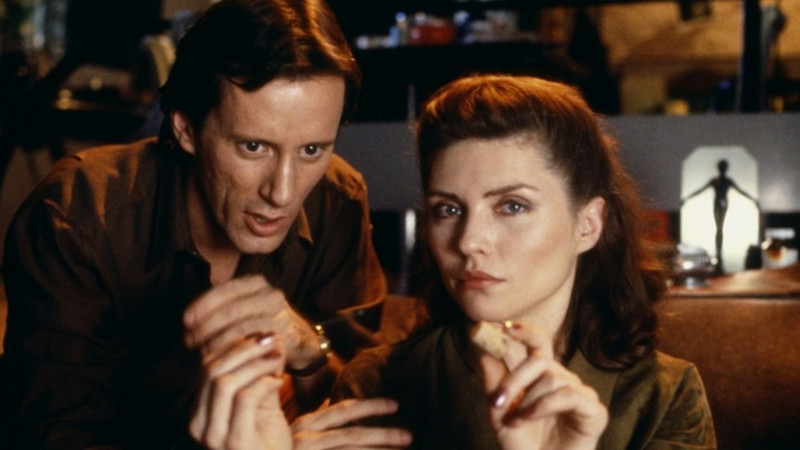
David Cronenberg is one of the few, if not the only directors in the film industry that has established himself as prolific and legendary filmmaker by writing, producing and directing mostly horror movies. What separated Cronenberg from other filmmakers in the horror genre is his films were always thought provoking, visceral, and ahead of their time.
While Cronenberg never disappointed the horror fan base by delivering blood and gore along with incredible special effects, his films also had political and social context which often seemed like subtle messages and in some cases warnings or even dire predictions of things to come.
Cronenberg’s 1975 film “Shivers”, about a parasite infecting victims through sexual contact and turning them insane lunatics, somewhat predicted the AIDS epidemic that would go on to cause fear worldwide less than a decade after the film was released.
When “Videodrome” was released in 1983, Cronenberg had created a film that was a warning of things to come, by crafting a premise that appears more relevant in our current age of smartphones, apps, search engines and the internet. In “Videodrome”, the newest technology in the early 80s were cable television, VCRs, and VHS tapes, and most of that technology is now obsolete, but one thing about the movie which hasn’t disappeared is media content.
In the film there’s a visual content known as Videodrome that causes the viewer to hallucinate and fall victim to mind control, turning the viewer into a homicidal killer. The signal was also designed to cause brain tumors to grow, killing whoever watched the Videodrome content within a period of time.
In 1983, this was interesting concept, but in 2017, the idea is downright scary because in today’s world everyone is consumed by media content delivered to us by our smart devices, cable television, internet, and streaming services like Netflix.
If the Silicon Valley created their own version of Videodrome, millions if not billions of people would fall victim, and this scenario is not so far-fetched. In 2014, Facebook came under heavy criticism for conducting a psychological experiment by developing algorithms that altered users’ newsfeeds to see how their moods would be affected.
Imagine if a company like Facebook with billions of users decided to deliver media content with darker intentions? With the film “Videodrome”, Cronenberg once again proved his ideas were ahead of their time and predicted a day where media content would have the ability to do great harm to the masses, and in the current age of social media, we’re more susceptible to this danger than anytime in our history. This fact alone makes the movie “Videodrome” a masterpiece of horror cinema.
1. Surrealism
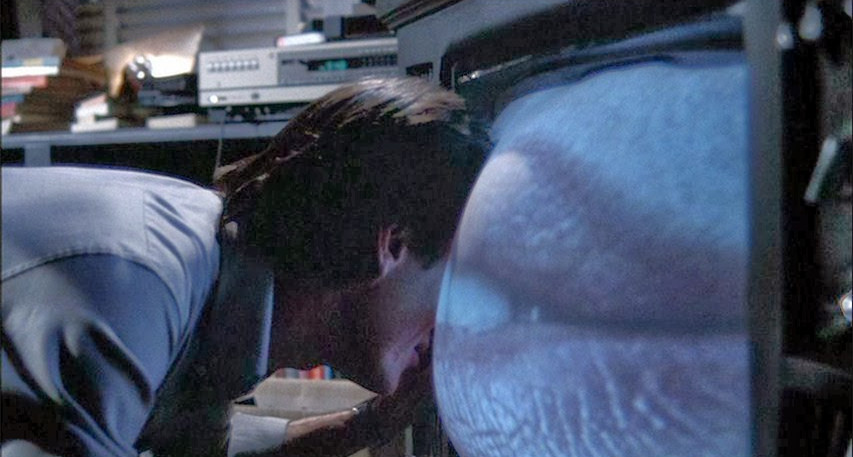
Cronenberg used horrific surrealistic imagery throughout “Videodrome” to capture what some call “body horror”. Man and machine both transform throughout the film. A television set that comes alive pulsating as if it’s breathing, as we see the mouth of a woman wearing red lipstick trying seduce the main character Max, played by James Woods.
The television screen starts to expand outward; we hear the sensual moans coming from the woman on the screen and Max, under full control of Videodrome, sticks his head into the screen as the machine has now become human. Later on as Max falls deeper under the control of Videodrome, a hole opens up on his stomach were a VHS tape can be inserted to further control him, the human now becomes the machine. Max becomes more machine-like when his hand turns into a grotesque hybrid of a gun made out flesh.
Cronenberg never makes it clear in the movie if the transformations are only hallucinations caused by Videodrome, or if the signal has the ability to transform human beings. The film does give a subtle hint to the latter because Videodrome causes brain tumors to grow in people’s heads after watching the content delivered by the Videodrome signal.
Cronenberg uses surrealism brilliantly throughout the film making the horror more thought-provoking because he’s not relying on gore to get a cheap scares; he’s using intense images to disturb the audience.
2. Torture

Lead character Max Renn, the president of a cable television station that broadcasts mostly soft porn, becomes fascinated by the media content being broadcast by a pirate signal coming from Malaysia – the show is called Videodrome. The disturbing television program shows a chamber where people are being tortured and eventually murdered. Max wants to buy the rights to Videodrome so he can air it on his cable show.
Cronenberg introduces a bit of morality because anyone watching a show featuring torture would have questionable ethics. Whether out of curiosity or entertainment, watching this type of content is unacceptable, but yet in the age of the internet, this type of content is available for anyone to watch from the safety of their homes, and they don’t have to travel to the dark web to find it.
Even on Facebook, a lot of questionable videos can pop up on your newsfeed at any time, showing violence or graphic images, and only recently has Facebook blacked out the videos, warning about the graphic content, giving you the choice to click on it and view it.
Cronenberg warned with his movie “Videodrome” that viewing this type of graphic content could affect your mental stability and now decades later we’re exposed to this graphic content daily on social media platforms like Facebook or search engines like Google.
The nightmare of “Videodrome” has now become reality. As consumers of this media content, do we really know the long term consequences of being exposed to this graphic visual content via social media?
3. Long Live the New Flesh
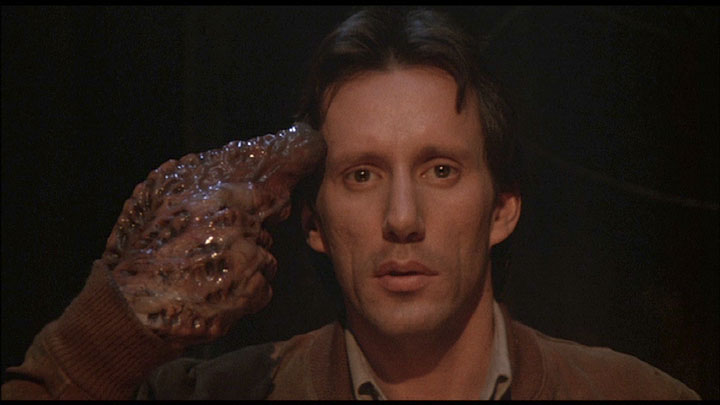
In the film, Max undergoes a physical transformation, and many have described “Videodrome” as a body horror film because the grotesque alteration of Max’s body. But once again, Cronenberg is giving both a prediction of things to come. In “Videodrome”, watching the media content created a new flesh in the viewer and in our current day where people love tattoos, body piercings and other body modifications, the new flesh is happening right now.
We’re in the beginning stages where some companies are encouraging their employees to be microchip so they can seamlessly access the company’s facilities. And what about the future when computers can be implanted into humans? If Apple made an iPhone that could be implanted inside the human body, it’s obvious that millions of consumers would buy this new product.
Cronenberg warned us about the new flesh in “Videodrome” because once man merges with machine, whoever controls the machines will also be able to control man as well. The new flesh will also reach our perception of reality as well; an ominous line of dialogue by the character Brian O’Blivion predicted in some ways our current dependence on social media for information: “The battle for the mind of North America will be fought in the video arena: the Videodrome. The television screen is the retina of the mind’s eye. Therefore, the television screen is part of the physical structure of the brain. Therefore, whatever appears on the television screen emerges as raw experience for those who watch it. Therefore, television is reality, and reality is less than television.”
4. David Cronenberg
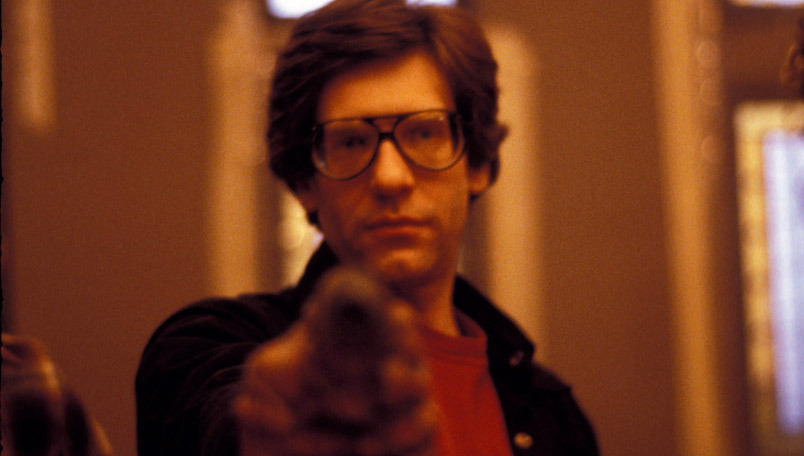
Cronenberg started out his career working with film director Ivan Reitman. The director of “Stripes” and “Ghostbusters” produced Cronenberg’s first two features films, “Shivers” and “Rabid”. Cronenberg would go on to pioneer the body horror, a type of horror film that dealt with the transformation or infection of the human body.
Cronenberg’s philosophy regarding body horror has to do with society’s own preconceived notion of the human body, which differs from his own, and the director had this to say: “But because of our necessity to impose our own structure of perception on things we look on ourselves as being relatively stable. But, in fact, when I look at a person I see this maelstrom of organic, chemical and electron chaos; volatility and instability, shimmering; and the ability to change and transform and transmute.”
Cronenberg’s style of filmmaking and storytelling has helped him transcend beyond the horror genre in some respects; you can argue that Cronenberg doesn’t actually make horror films, and that his movies can best be described as “disturbing” films. The idea for “Videodrome” originated from his early days as a young child growing up in Canada.
Late at night when the Canadian television went off the air, signals from Buffalo, New York would start broadcasting on the television set and Cronenberg feared as a young child he would see something he shouldn’t. Cronenberg’s childhood fear of subversive media content was the foundation for “Videodrome” and the film is more of a cautionary warning of things to come disguised as a horror movie.
The entire world is now living in the future that Cronenberg warned us about in “Videodrome”; we’re saturated with so much technology that no one can escape from the harmful subversive media content, even if they wanted to. This fact alone show how much of a visionary filmmaker David Cronenberg has been throughout his career.
5. James Woods
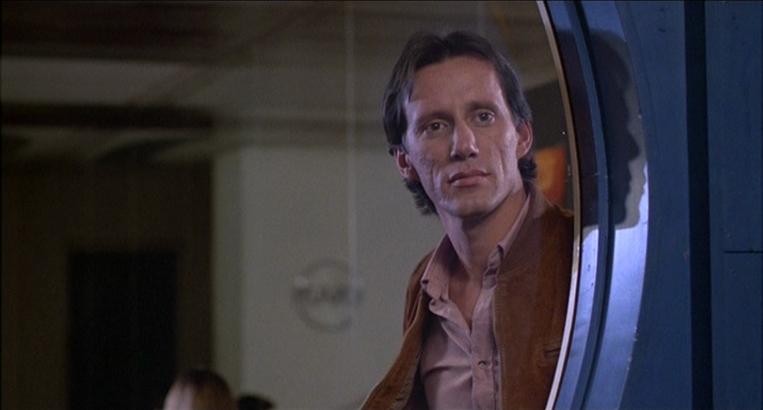
In the 80s, James Woods made a career out of being (for a lack of a better term) a likable asshole, because of his immense charm and great acting abilities. He could play both villain or good guy and is one of the best character actors in the business, which has enabled him to work with some of the best directors in Hollywood, from Sergio Leone, Oliver Stone and Martin Scorsese. He was offered the lead role in the film “Reservoir Dogs” but his agent rejected the project without showing him the script, and when Woods found out he fired his agent.
“Videodrome” is one of Woods’ best performances. The character of Max Renn starts off as a cocky unlikable corporate president, but once he becomes infected by the Videodrome signal, Woods makes the character more sympathetic as we watch him become trapped in something that’s way over his head. Watching “Videodrome”, you couldn’t imagine the film having the same powerful impact without James Woods’ captivating performance.
6. The Conspiracy
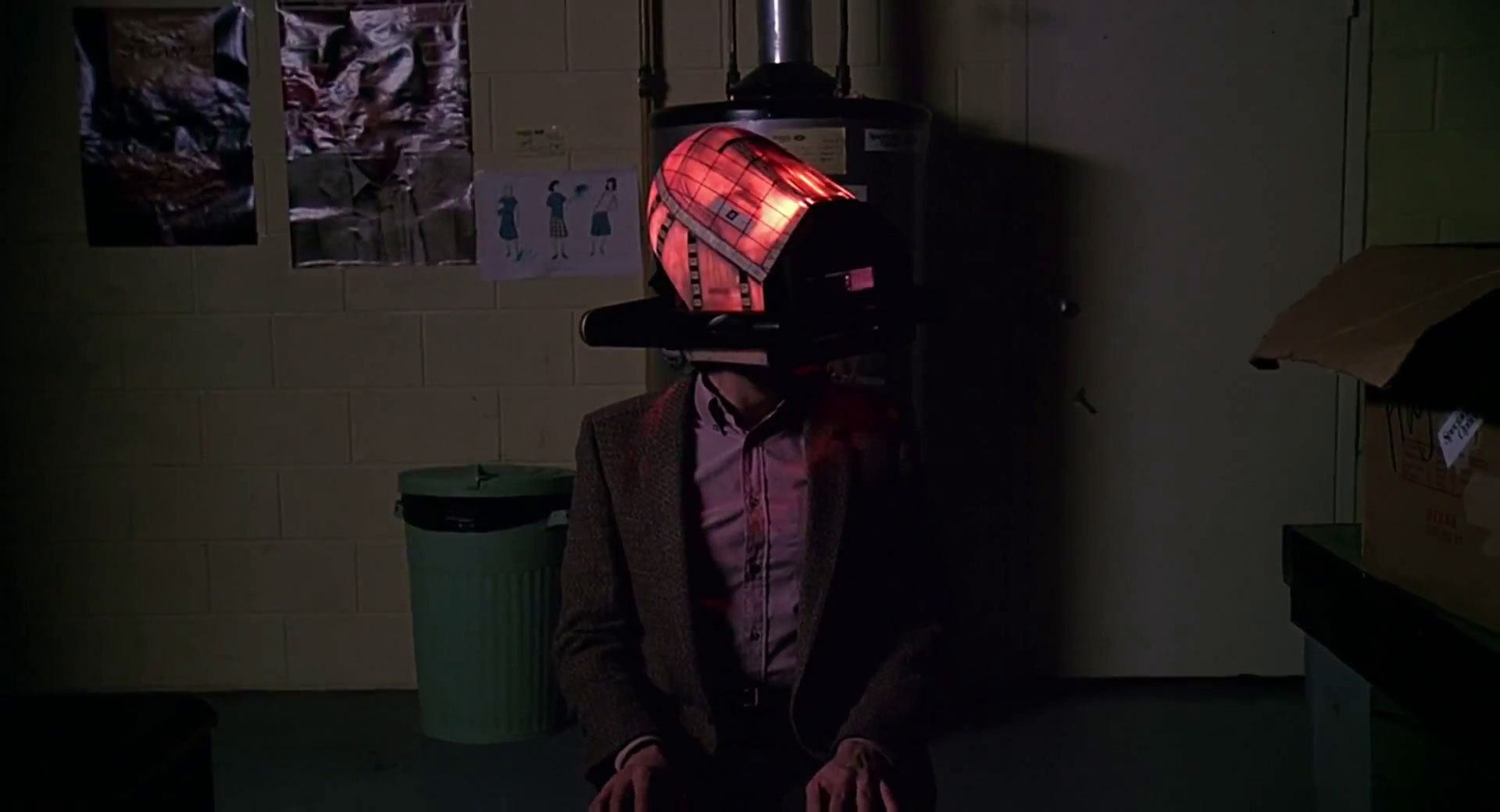
On the surface, Spectacular Optical Corporation is a company that sells eyewear, but the corporation is just a front; in reality they’re a weapons manufacturer and the sinister organization behind Videodrome.
The character Harlan works at the cable station that Max runs, operating an unauthorized satellite looking for content from around the world. Harlan discovers Videodrome and shows the program to Max. But in actuality, Harlan is secretly working for Spectacular Optical Corporation and is part of the conspiracy to spread Videodrome to certain sectors of the population.
When Max discovers the betrayal, Harlan confesses the true intention of Videodrome in this line of dialogue: “North America’s getting soft, patrón, and the rest of the world is getting tough. Very, very tough. We’re entering savage new times, and we’re going to have to be pure and direct and strong, if we’re going to survive them. Now, you and this cesspool you call a television station and your people who wallow around in it, your viewers who watch you do it, they’re rotting us away from the inside. We intend to stop that rot.”
After that revelation, Max realizes he’s a pawn in a conspiracy, but can we now also say that about ourselves more than 30 years later after “Videodrome” was released in theaters? In today’s world we’re consumed by smart devices and social media and rarely question the media content that’s delivered to us.
Do we honestly think the reasons we waste countless of hours on Facebook is because the site is insanely entertaining? Or why do always travel to Google first to get the information we’re looking for? Could it all be by design? Are these big multi-billion dollar companies in the tech world using special algorithms to make us addicted to the most popular sites on the internet? These tech companies want to change the world as we know it, but can we really know their true intentions? Because money and power always corrupt, and the tech world could go rogue one day and introduce something vile into society.
Cronenberg put a powerful message and warning in the film “Videodrome”, because in a world consumed with media content, Cronenberg warned that some media content is dangerous for human consumption.
Author Bio: R. Prince is a filmmaker from Harlem, New York and the author of the book How to Roll a Blunt for Dummies.